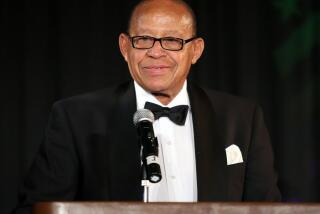Shouting at ‘Pharoah’ : AUTOBIOGRAPHY : GO AND TELL PHAROAH: The Autobiography of the Reverend Al Sharpton,<i> By Al Sharpton and Anthony Walton (Doubleday; $23.95; 276 pp.)</i>
- Share via
Controversy has swirled around Brooklyn preacher and civil rights activist Al Sharpton ever since he first stepped up to the pulpit, much against his father’s wishes, at the age of 4. Now, still only 41, Sharpton sets out to answer, in an autobiography co-authored with journalist Anthony Walton, the political and media critics who have labeled him a con artist and opportunist.
“Go and Tell Pharoah” can scarcely be compared, as the book jacket would have us believe, to “The Autobiography of Malcolm X.” Beyond the fact that Sharpton possesses nothing close to Malcolm X’s charisma, the book’s conversational tone lacks the depth, authenticity and candor of that classic. Indeed, while Sharpton spends a few pages downplaying allegations about his associations with organized crime and his 1980s role as an FBI informant, he fails to come clean about being captured on videotape offering to facilitate a drug deal with a well-known gangster. The activist later agreed to cooperate with the FBI in gathering intelligence on certain mobsters and boxing figures. (Author Jack Newfield describes Sharpton’s role at some length in his 1995 biography of boxing promoter Don King, “Only in America.”)
Yet there is another side to the Sharpton story. He claims legitimate credit for having raised public awareness about several of the worst racial outrages of the past decade, including the murderous white-on-black assaults in Howard Beach and Bensonhurst, N.Y. Given his experiences, including having been stabbed himself during a protest rally in 1990, it is not surprising that Sharpton feels justified in calling New York “perhaps the most racist city in the country.”
And the reverend’s high-profile harangues against social injustice have certainly earned him not only the enmity of the white power structure but the support of many blacks who consider him their champion. This is evidenced in Sharpton’s two unsuccessful campaigns for the U.S. Senate; as the first black candidate to run for a major party statewide in 1992’s New York Democratic primary, he pulled more than two-thirds of the black vote.
He was also, Sharpton notes wryly, “the first person in the nation to run against two people who had arrested me” (former district attorneys Elizabeth Holtzman and Robert Abrams). Sharpton proudly tallies up 20 arrests over the years, all civil disobedience cases except for one failed attempt to nail him on fraud charges.
Sharpton’s love of the limelight is traced back to his “wonderboy” days when, as a 10-year-old Pentecostal preacher, he was already addressing crowds of as many as 10,000. His sense of mission was fueled by early encounters with Adam Clayton Powell and Jesse Jackson, who became a lifelong friend. Working closely with the latter in organizing a youth division for Jackson’s Operation Breadbasket in the late ‘60s, Sharpton took up his first civil rights battles against corporate discrimination practices.
There has been much for him to agitate about, from the Bernhard Goetz subway shooting case to the Crown Heights riot between blacks and Jews. But if Sharpton’s presence on the scene has been ubiquitous, it has not always been as purely motivated as he portrays it. Many observers, for example, believed his leadership during the wrenching Crown Heights situation was diversionary, if not incendiary.
No doubt Sharpton is sincere in describing a reshaped Christian vision that followed his near-miss with death. His politics today are much more geared toward coalition-building.
But “Go and Tell Pharoah” generally protests too much against the efforts of the powers-that-be to undermine him, and it comes across as overbearing horn-tooting with such remarks as: “It seems like I was always prominent in some way.”
In urging black youth to get beyond anger and change the power equation in America, Sharpton summarizes his book’s title: “You can’t beat Pharoah by matching his tricks with miracles, and miracles are the fruit of righteousness.” Here the preacher emerges, which, Sharpton concludes, is above all what he remains.
More to Read
Sign up for our Book Club newsletter
Get the latest news, events and more from the Los Angeles Times Book Club, and help us get L.A. reading and talking.
You may occasionally receive promotional content from the Los Angeles Times.










